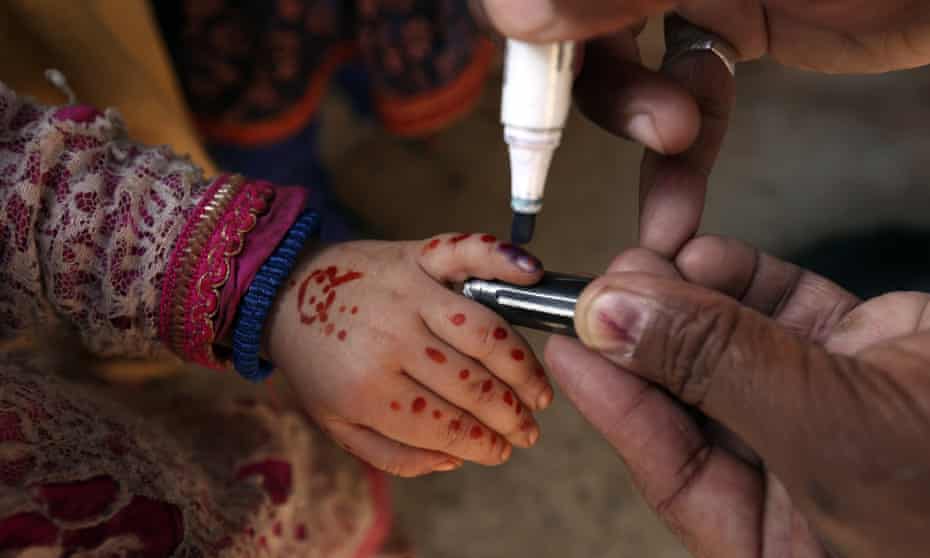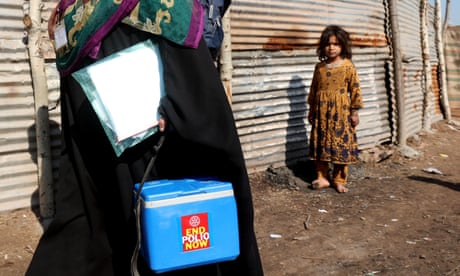Investigation launched as first cases in a year blamed on vaccine refusal fuelled by clerics and falsification of records by parents

A child’s finger is inked to show a polio dose has been given. Some health workers are said to be helping parents avoid vaccinations by falsely marking a child’s fingers. Photograph: K Chaudary/AP
Global development is supported by

Global development is supported by

About this content
Haroon Janjua
THE GUARDIAN
Haroon Janjua
THE GUARDIAN
Tue 7 Jun 2022
Pakistan’s polio eradication campaign is in disarray after an alarming jump in cases last week. Eight polio cases have now been reported in children over the past month in North Waziristan district, bordering Afghanistan. They are the first cases in more than a year.
This new outbreak, officials believe, is due to parents falsely marking themselves and their children as vaccinated, and the government has launched an investigation into the outbreak.
North Waziristan is a former Taliban stronghold in north-west Pakistan, where high vaccine refusal rates are thought to be behind the new cases.
“Fake markings and refusals are two key reasons in the recent outbreak, with polio staff conspiring with parents to miss the vaccination,” said Zulfiqar Babakhel, of Pakistan’s polio eradication programme, referring to how parents suspicious of immunisation have got hold of special pens used by health workers to mark vaccinated children’s fingers.
Dr Shahzad Baig, national programme coordinator, said: “The cases are highlighting exactly where the challenges lie, and we are doing our utmost to ensure that the virus remains contained and we fight it till the end.”
Before this surge, the last case of child paralysis as a result of polio was reported in January last year.
The federal health minister, Abdul Qadir Patel, said: “Following the first two cases in April, the polio programme took immediate steps to ringfence this area and prevent the virus from spreading further, particularly in the historic reservoirs [of infection] of Karachi, Peshawar and Quetta.
“Pakistan has had tremendous success against polio over the past few years, and we are taking all steps to protect the gains made by the programme.”
It was crucial for parents to vaccinate their children every time it was due, said the minister, as every dose of polio vaccine built further immunity.
Nationwide vaccination drives have been carried out door-to-door for the past 25 years. The teams are mostly female health workers, often volunteers, who have to be escorted by security guards.
Three such campaigns have been carried out in January, March and May this year. During the March campaign in north-western Pakistan, gunmen shot and killed a female polio worker. In January, also in the north-west, assailants shot and killed a police officer providing security to the polio team.
Militant groups in Pakistan have killed more than 100 health workers and their security guards since 2012.
According to the World Health Organization, Pakistan is one of only two countries, with Afghanistan, where the wild polio virus is still endemic.

Spectre of polio returns to haunt Pakistan as baby boy is left paralysed
Anti-vaccination sentiment in Pakistan is deeply rooted. Clerics and others have spread myths that vaccines are a conspiracy by the west to sterilise Muslim children, and a husband was allowed to divorce his wife for vaccinating their children against polio.
In April 2019, more than 25,000 children were rushed to hospital during a mass panic in north-west Pakistan after the spread of unfounded rumours about polio vaccines causing fainting and vomiting.
Pakistan’s polio eradication campaign is in disarray after an alarming jump in cases last week. Eight polio cases have now been reported in children over the past month in North Waziristan district, bordering Afghanistan. They are the first cases in more than a year.
This new outbreak, officials believe, is due to parents falsely marking themselves and their children as vaccinated, and the government has launched an investigation into the outbreak.
North Waziristan is a former Taliban stronghold in north-west Pakistan, where high vaccine refusal rates are thought to be behind the new cases.
“Fake markings and refusals are two key reasons in the recent outbreak, with polio staff conspiring with parents to miss the vaccination,” said Zulfiqar Babakhel, of Pakistan’s polio eradication programme, referring to how parents suspicious of immunisation have got hold of special pens used by health workers to mark vaccinated children’s fingers.
Dr Shahzad Baig, national programme coordinator, said: “The cases are highlighting exactly where the challenges lie, and we are doing our utmost to ensure that the virus remains contained and we fight it till the end.”
Before this surge, the last case of child paralysis as a result of polio was reported in January last year.
The federal health minister, Abdul Qadir Patel, said: “Following the first two cases in April, the polio programme took immediate steps to ringfence this area and prevent the virus from spreading further, particularly in the historic reservoirs [of infection] of Karachi, Peshawar and Quetta.
“Pakistan has had tremendous success against polio over the past few years, and we are taking all steps to protect the gains made by the programme.”
It was crucial for parents to vaccinate their children every time it was due, said the minister, as every dose of polio vaccine built further immunity.
Nationwide vaccination drives have been carried out door-to-door for the past 25 years. The teams are mostly female health workers, often volunteers, who have to be escorted by security guards.
Three such campaigns have been carried out in January, March and May this year. During the March campaign in north-western Pakistan, gunmen shot and killed a female polio worker. In January, also in the north-west, assailants shot and killed a police officer providing security to the polio team.
Militant groups in Pakistan have killed more than 100 health workers and their security guards since 2012.
According to the World Health Organization, Pakistan is one of only two countries, with Afghanistan, where the wild polio virus is still endemic.

Spectre of polio returns to haunt Pakistan as baby boy is left paralysed
Anti-vaccination sentiment in Pakistan is deeply rooted. Clerics and others have spread myths that vaccines are a conspiracy by the west to sterilise Muslim children, and a husband was allowed to divorce his wife for vaccinating their children against polio.
In April 2019, more than 25,000 children were rushed to hospital during a mass panic in north-west Pakistan after the spread of unfounded rumours about polio vaccines causing fainting and vomiting.
No comments:
Post a Comment